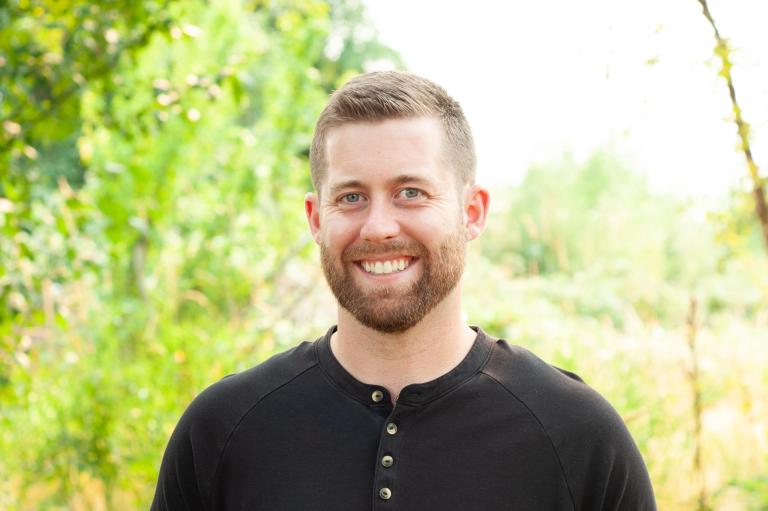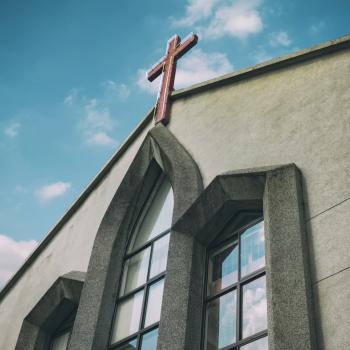
If you’re anything like me, your deep longing to have an embodied spirituality has stirred within you an experience of disillusionment, one that makes it hard to remain within spaces of organized religion.
Perhaps you’re still engaged with a church community, but feel like something is spiritually missing.
Or perhaps you’ve left and you’re charting your own path, seeking to foster your spirituality beyond the walls of any institution.
For me, one of the scariest, and most freeing, things about leaving behind my dedication to organized religion is that it often feels like I’m in an open-ended limbo – a liminal space between what was and what could be. I often look around and ask:
- Where are my people?
- Who can I explore this disillusionment with?
- What can I do to find new community in this in-between space?
Experiencing Disillusionment
Parker Palmer writes that in these moments of disillusionment, something powerful is happening within us:
“We say we are being ‘dis-illusioned’. That is, we are being stripped of some illusions about life, about others, about ourselves. As our illusions are removed, like barriers on a road, we have a chance to take that road farther toward truth. Instead of commiserating and offering a shoulder to cry on when a friend says that he or she [or they] is disillusioned, we ought to congratulate, celebrate, and ask the friend how we can help the process go deeper still.” (Active Life)
And so, if you find yourself in this space, congratulations! Welcome to the curiously glorious in-between, this great space of unknowing. Together, let’s explore how “we can help the process go deeper still.”
How have you experienced disillusionment within your spiritual journey?
An Embodied Spirituality
During my final week with the Living School, a program through Richard Rohr’s Center for Action and Contemplation, Richard spent some time talking with us and answering any last questions we had as his students. In response to one of these, he shared that he thinks our world needs more “faithful questioners and social poets.”
The phrase stuck with me in a deeply resonant way; I get the feeling this is what it means to have an embodied spirituality, one in which our bodies, hearts, and minds are all working together to explore our Reality.
An embodied spirituality is centered on diving deep into what it means to be human so that we may better understand and share our True Selves, the presence of the Divine within us, in the context of our communities.
It is a spirituality that increases our capacity to become faithful questioners and social poets.
Faithful Questioners
When I became a teacher, I was trained in a very specific method of instruction known as project-based learning. The idea is simple: rather than focusing on rote memorization of facts and book-learning, teachers engage students in hands-on projects and create opportunities for them to learn through the act of trying to solve a real-world problem.
At the beginning of each project, either the teacher or the student creates a “guiding question,” an inquiry that sets the path for the project. A good question will be open-ended, focus on process, and lead the student toward a creative solution. A not-so-good question will be one that requires a yes/no answer or one that will lead all students to the same answer.
When we engage a spirituality that increases our capacity to become faithful questioners, we are choosing to step into the unknown where creativity and innovation manifest themselves.
And central to that, this form of spirituality is one that will teach us to ask good, open-ended questions that invite us into investigating the depths of Life, both within us and around us.
My definition of a faithful questioner: A faithful questioner is one who asks the deep questions, seeking to get to the root of the matter, so that they may build, and rebuild, an experiential and loving understanding more whole than the one they had before.
In asset-based community development, there is a core principle: questions are more important than answers. It’s the questions that allow us to experience transformation, not the expected outcome. Or in Gandhi’s words, “There is no path to peace. Peace is the path.”
Any healthy spirituality that might grow within us will be one that invites our curiosities, teaches us to adventure through the terrain of the Unknown, and helps us to recognize the divinity and dignity within all things.
How have your faith/spiritual communities taught you to ask questions?
Social Poets
In October, Pope Francis addressed those who are working for social justice and worker’s rights across the globe.
He said:
“This is what I like to call you: social poets. You are social poets, because you have the ability and the courage to create hope where there appears to be only waste and exclusion. Poetry means creativity, and you create hope…Seeing you reminds me that we are not condemned to repeat or to build a future based on exclusion and inequality, rejection or indifference.”
An embodied spirituality is not one that will allow for the mere intellectualizing of the Divine. It is the experienced divinity and dignity within all things that drives us into social engagement and leads us to develop creative solutions to the crises of the day.
And not only that: if we are to be social poets, it means we must learn to act with a poet’s love, affirming and honoring the present moment. Just as a poet is carried away in the beauty of her words, and just as a ceramicist loses all track of time in the manifesting of themselves in their creation, a social poet becomes so enamored by the dignity of Life that there is no option other than to be present with it, publicly honoring its right to thrive.
My definition of a social poet: A social poet is one who manifests love publicly, especially in the seemingly darkest of places, through the ways they create, honor, and celebrate the beauty of our world.
Cornel West says “justice is what love looks like in public” and a social poet, rooted in an embodied spirituality, is committed to this truth in the ways they seek creative justice that honors the dignity of all people, all communities, and all experiences of Life.
How were you raised to experience Love in social justice work?













